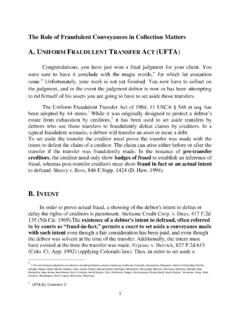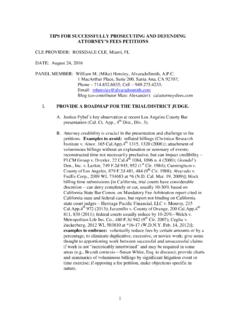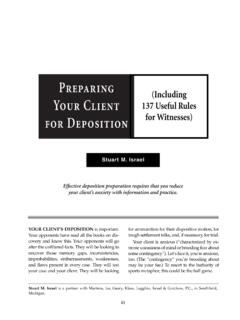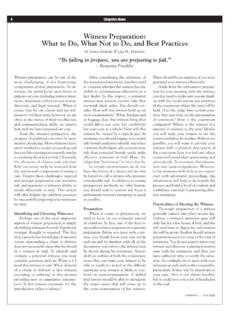Transcription of Taking, Defending, & Preparing for Powerful Depositions ...
1 Taking, defending , & Preparing for Powerful Depositions Live Telephonic CLE Rossdale CLE A National Leader in Attorney Education 2014 Rossdale CLE Winning Strategies Ask open ended or non-leading questions Use "Why" Throw our the Rules of Evidence Ask big questions that get to the heart of the issue Maintain an inquisitive attitude 2 A Quick Note References made in these materials refer to the Federal Rules of Civil Procedure (hereinafter Fed. R. Civ. P. ). Although the reference is to Fed. R. Civ. P., each jurisdiction and state across the country maintains rules that reflect similar positions. 3 Aim of these Materials Foster honest testimony How to prepare your client How to prepare your client for video performances 4 Depositions from 30,000 Feet Up 5 Why do we take Depositions ? Obtain information Evaluate the overall strengths and weaknesses of the case Preserve evidence Assist in discovery 6 Protective Techniques to Use During deposition Correcting transcript Fed.
2 R. Civ. P. 30(e)(1) Court assistance Fed. R. Civ. P. 30(d)(3)(A) Objections Fed. R. Civ. P. 30(c)(2) Instructions not to answer Fed. R. Civ. P. 30(c)(2) Ask questions Fed. R. Civ. P. 30(c)(1) 7 What should the deposition accomplish? 8 Goal of deposition , Part I Determine what are the relevant facts Determine who has personal knowledge of the relevant facts Preserve testimony for trial Rely upon state rules and Federal Rules, like Fed. R. Civ. P. 26(b)(1) - reasonably calculated to lead to the discovery of admissible evidence Create sound bites Create admissions for use at trial Capture witness untruthfulness (Fed. R. Civ. P. 32(a)(2) 9 Goal of deposition , Part I Facilitate Settlement Strengthen and develop foundation for introduction of evidence , authentication and identification Evaluate deponent's strengths and weaknesses Demonstrate negative characteristics of deponent Gain evidence to use for summary judgment Gather additional background information for additional discovery Assist in building foundation for information for experts 10 Use Techniques and Mistakes Not To Make 11 Winning Tips Craft questions in such a manner to conceal your Do not expose the facts that you know in asking questions Carefully note the weaknesses of your client to resolve in coaching before trial Realize that every minute of the deposition is costing you (contingency case))
3 Or your client 12 Limitations of the deposition & Items to Keep in Mind 13 Items to Keep In Mind, Part I Fed. R. Civ. P. 30(d)(1) limits the deposition to 7 hours in 1 day Ask only questions that are plausibly relevant Only take needed Depositions Do not emphasize your theory of the case 14 Items to Keep In Mind, Part II Depositions are not the place for cross-examination Vary techniques used in deposition so deponents do not become too familiar with your style Save your hardest, toughest question for the courtroom but ask some form of the question to "lock-in" witness at deposition 15 Items to Keep In Mind, Part III Once your observe a the weakness of a deponent, do not harp upon it as you can exploit the weakness at trial to your advantage Going after and further demonstrating a weakness of a deponent may lead the opposing party to more actively coach the deponent to transform her into a better courtroom witness 16 Avoiding Improper Goals 17 Items to Avoid Notice and/or take a deposition to "milk" fees Use Depositions to prolong litigation or force settlement Harass, annoy, or oppress Engage in bad faith tactics during deposition 18 Asking Effective Questions 19 Designing Effective Questions, Part I Ensure that the record includes specific details Do not ask about "that exhibit" Instead, ask about the " deposition Exhibit Number 4, Jerry Smith's Resignation Letter date March 2, 2011" Ask deponent to describe exhibit or title of exhibit on the record 20 Designing Effective Questions.
4 Part II To properly lead, ask short, tight, leading questions that can be answered with a "yes" or "no" To give deponents an opportunity to provide her or her story, ask "open ended" questions Ensure questions can be asked independnently of each other Questions should not refer to or rely upon previously asked questions Structure short, simple questions Break long questions into multi-part short questions 21 Designing Effective Questions, Part III Do not use negatives Avoid double negatives Think of asking questions that a jury could easily follow Design questions to create "sound bites" for use at trial 22 Techniques for Videotaping 23 Videotaping Considerations If economically possible, always videotape Non-verbal responses are more Powerful than words It is often better to use video at trial instead calling the witness 24 Videotaping Tips Provide notice pursuant to Fed.
5 R. Civ. P. 30(b)(3) Consider the effect of videotape on determining the pace, style, and tone of questions Effectively Use Exhibits Ensure that questions are fully answered on the record , don't accept nods of the head to affirm an answer 25 Effectively Handling Evasive Answers Repeat the question as often as necessary Confront the witness if he is evasive Request that she answer the question in a direct manner Properly object to evasive answers Move to strike any non-responsive answers 26 Rules to Remember Recall Fed. R. Civ. P. 32(d)(3)(B)(i) - object to forms of answers waived unless timely made during the deposition Recall Fed. R. Civ. P. 37(a)(4) - incomplete or evasive answers are treated as failure to answer 27 Techniques for Handling Questions 28 BIG Questions Determine the detail sought in your questions BIG Questions should seek to discover: the witness' source of knowledge was the information observed directly or supplied assumptions of the information the witness' memory for details the witness' ability to provide accurate testimony the witness' motive and bias 29 Considerations in Follow-up Questions Witness' reaction to questions Endeavor to ask questions that assume facts to box witnesses into answered Example: If you are trying to determine whether the witness flew in for the deposition , you could ask: "Did you fly here today?
6 " The better question is "Was the airport busy when you came in for the deposition today?" 30 Often Overlooked Items Ask for production of documents used to refresh recollection Do not be afraid to refresh the witness' recollection Look for visual signs of a lying witness 31 Techniques for Dealing with Lying Witnesses, Part I Ask witnesses to answer questions with specific facts Ask questions that follow-up to previous questions Make the lying witness have to further create a false story Recall that testimony on unimportant matters can create opportunities to impeach 32 Techniques for Dealing with Lying Witnesses, Part II Avoid asking questions in chronological order Jumping from time periods inhibits lying witnesses Make the questions become quicker Structure questions to suggest that you wish to obtain one answer, when in fact.
7 You seek the opposite answer 33 Witnesses Who Do Not Know Enough 34 Effective Techniques for Witnesses Who Know Too Little, Part I If knowledge is not sought, box the witness into admitting that he does not know about the subject matter Ask the witness to identify the sources of information that could lead to an answer Prove that the witness' memory cannot be refreshed Do not stop at answers like "I cannot recall the exact details of the conversation." Confirm that no the witness has no recollection 35 Effective Techniques for Witnesses Who Know Too Little, Part II If you want the witness to have recollection, the questions should be aimed at increasing testimony and demonstrating that the absence of knowledge is false Box in the witness' claimed absence of knowledge so that it cannot improve at trial Demonstrate to the witness that it is illogical for the witness to not remember Confront the witness Remind the witness that failure to disclose all knowledge is a violation of the oath and grounds for sanctions Recall Fed.
8 R. Civ. P. 37(a)(B)(i) - motion for order to compel 36 Before 37 Concluding Questions Ask summary questions Summarize the witness' prior testimony Ask questions which might lead to admissible evidence, even though the answer may not be admissible evidence Don't be intimidated by the defending lawyer's time pressures or the witness's evasiveness 38 When to Stop Asking Questions 39 Ending your deposition Ask as few questions as possible and as many questions as needed Generally, the more truthful the witness, the fewer questions will be asked If the questioner perceives that the witness is lying, more questions will need to be asked If you feel that the questions are hurting your case, more questions will need to be asked Ask as many questions as it takes to really learn the whole story 40 Preparing your Witness for the deposition 41 Effective Preparation Techniques Review witness recollection Refresh witness recollection Explain what to say when asked if memory was refreshed by review of documents 42 Goals of Preparation Explain the point of the deposition Remind clients that questions should be answered as succinctly as possible: example: if asked, Do you have the time?
9 The answer should be yes, but should not be It is noon. Remind clients to tell the truth and not to guess Ensure clients only answer questions that they understand 43 Training Clients Demonstrate the following to your clients: Compound Misstates prior testimony Assume facts not in evidence Vague Incomplete hypothetical Ambiguous Asked and Answered Calls for Speculation Argumentative 44 Preparing Clients for Videotaped Depositions 45 How to Prepare the Client to be Videotaped Client should act like jury is in room Client should not be arrogant Client should avoid mannerisms Client should wait a few second after each question to ensure that there is a consistent pace this will help when the client is asked more difficult questions later 46 Effectively Protecting the Witness 47 defending Depositions Recall that under Fed.
10 R. Civ. P. 30(d)(1), additional time may be ordered if the attorney is overly protective Recall that under Fed. R. Civ. P. 30(d)(2), sanctions may be ordered to those who impede or delay the deposition State objections in a non-argumentative manner Recall that objections are waived if not made at the deposition You may instruct the witness not to answer only to preserve a privilege or enforce a court order 48 End of Materials 49














